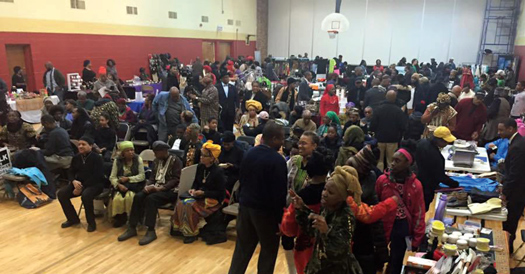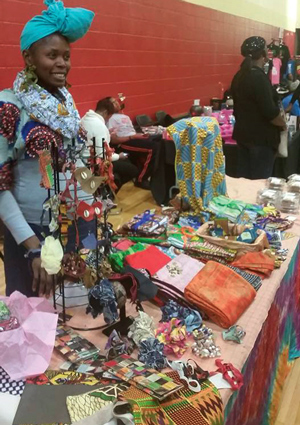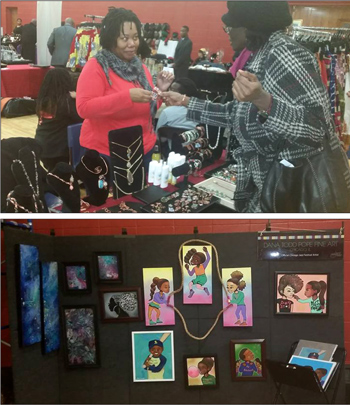Empowerment and economics in action at Kwanzaa expo
By Toure Muhammad -Contributing Writer- | Last updated: Jan 6, 2016 - 11:16:59 AMWhat's your opinion on this article?

Hundreds fi lled the gymnasium at Muhammad University of Islam in Chicago for the Ujaama Empowerment Expo. Photo: Toure Muhammad
|
CHICAGO—Hundreds from all over Chicago participated in the first ever Ujamaa Empowerment Expo held at the headquarters of the Nation of Islam on December 29.

Vendors displayed products and goods at the Ujaama Empowerment Expo.
|
“Ujamaa is the fourth principle of Kwanzaa, which represents cooperative economics, to build our own businesses, control the economics of our own community and share in all its work and wealth,” explained Student Minister Ishmael Muhammad, the National Assistant to Min. Farrakhan days before the event.
“It is because of our efforts and hard work in promoting the Justice Or Else! campaign that calls for our economic withdrawal and the redistribution of pain that brings us to the program of The Honorable Elijah Muhammad, which is to do for self,” he added.
The four-hour event held in Muhammad University of Islam’s gymnasium and hosted by The Black Mall, BRIJ Fund, the Nation of Islam, Bean Soup Times and Afrika Enterprises included
“Ted” like talks from some of Chicago’s most passionate community advocates.
“In a time where we have a lot of momentum around these economic boycotts for very individual situations, we need to harness that energy and strategically make sure that we are carrying on this work daily,” said key organizer TeQuila Shabazz of BRIJ Fund, a cooperative that aims to eradicate poverty and build wealth in Black communities of America first. “We don’t stop now. We keep going; longer than they did the Montgomery Bus Boycott until this becomes a lifestyle and we take full control of our capital.”

Over 40 vendors participated selling a variety of products such as jewelry, books, soaps and clothing. Photos: Nzinga X
|
The talks held during the program focused on key resources needed for survival of the Black community: natural capital (land and food), human capital (education, health/fitness and spirituality), cultural capital (traditions, language, arts, fashion and information), social capital (networks), physical capital (technology), political capital and financial capital (money).
“This Ujimaa empowerment expo is all about us being aware of our businesses, us understanding what buying Black does, and understanding where all of our capital lies. It’s not just in the dollar, but it’s in our resources, in our social, educational capital. Understanding how we treat one another, and how we engage one another, that’s our network,” said key organizer Cassiopeia Sledge of The Black Mall, an online directory of Black-owned businesses.
Speakers included Michael “Tekhen” Strode of the Healthy Food Hub, Sandria Washington of BlackDoctor.org, Rita Stewart, LeAlan Jones, Bahiya Shabazz, Neidra Crosby; Reese LaFrances, the Freedom Coach, Justice Collins, owner of the Cultural Connection; Revin Fellows of the National Black Agenda, author Obari Cartman, political activist Mark Allen and Nation of Islam members Lisa R. Muhammad and Toure Muhammad, the writer of this article and many others.
Attendees enjoyed a variety of vendors, viewed an economic empowerment film fest, and boasted the largest Black business “receipt turn in” where Afrika Porter of Afrika Enterprises was recognized for spending $4,000 with Black businesses in 2015.
The event was supported by the United Black American Progress Association, Universal Negro Improvement Association, National Black Wall Street Chicago, Black Wall Street Chicago all of which have a rich history of pushing the “buy Black” campaign.
INSIDE STORIES AND REVIEWS
-
-
About Harriett ... and the Negro Hollywood Road Show
By Rabiah Muhammad, Guest Columnist » Full Story -
Skepticism greets Jay-Z, NFL talk of inspiring change
By Bryan 18X Crawford and Richard B. Muhammad The Final Call Newspaper @TheFinalCall » Full Story -
The painful problem of Black girls and suicide
By Charlene Muhammad -National Correspondent- » Full Story -
Exploitation of Innocence - Report: Perceptions, policies hurting Black girls
By Charlene Muhammad -National Correspondent- » Full Story -
Big Ballin: Big ideas fuel a father’s Big Baller Brand and brash business sense
By Bryan Crawford -Contributing Writer- » Full Story






 Click Here Stay Connected!
Click Here Stay Connected!








